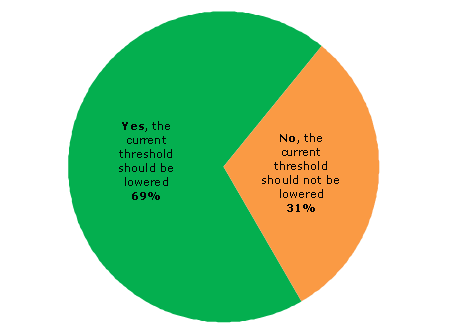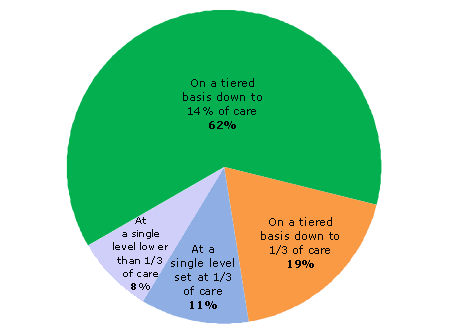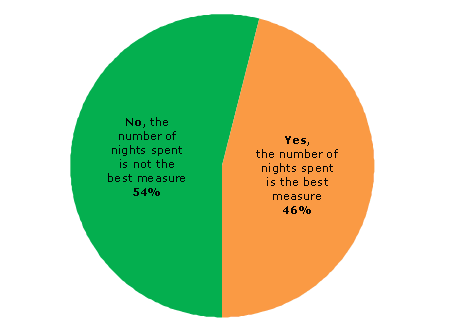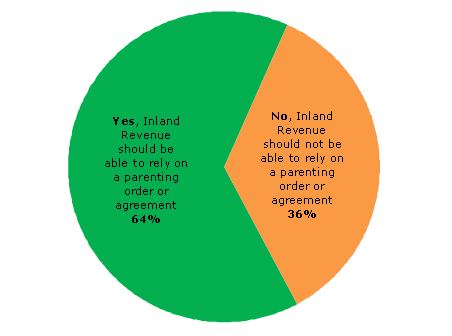Chapter 3 - Shared care
The discussion document suggested a greater level of recognition being given to lower levels of actual and regular care of a child by paying parents. This could be achieved by lowering the current deemed shared-care threshold, which is based on care for 40% of nights.
Other issues considered included how best to measure the care of children for this purpose, and whether Inland Revenue should be able to rely on a parenting order from the Family Court or a parenting agreement between the parents.
Results of online consultation
Q1: Do you think that the current “40% of the nights” test for shared care should be lowered to include other levels of regular care?

Note: The view that the current threshold should be lowered was particularly prominent amongst paying parents. Some 90% of paying parents felt that the threshold should be lowered, compared with 44% of receiving parents.
Q1(a): If you think it should be reduced, at what level do you think care should be recognised?

Q2: Do you think the number of nights a child spends with a parent is the best measure for working out whether there is shared care?

Note: Of the 54% who believed that the number of nights spent was not the best measure for working out whether there is shared care between parents, 73% felt that the total time spent with a child was the best measure.
Q3: Do you think that Inland Revenue should be able to rely on a parenting order or a parenting agreement to establish the number of nights a child spends with each parent?

Summary of comments on shared care
Reduction in the current shared care threshold
Most submitters agreed that the care threshold at which recognition is given for child support purposes should be reduced from the current deemed threshold of 40% of nights, although a small minority considered that anything less than equal care should not qualify for recognition. It was widely considered that paying parents are often incurring significant costs in caring for their children and these need to be recognised.
Various concerns were expressed about lowering the existing threshold, both in terms of the rates used and the way the threshold might apply. These included:
- That providing recognition at levels as low as 14% was too generous to the paying parent, in particular when the majority of everyday and other significant one-off costs were still being borne by the receiving parent.
- The fact that one of the options for shared care noted in the discussion document applies a single fixed percentage reduction over a range of levels of care. As costs are likely to vary within this range, it is argued that the recognition given should vary accordingly on a sliding scale.
- That use of a sliding scale would result in arguments between parents over who had care of their child for each day. In addition to creating uncertainty and animosity between parents, this could also result in significant administrative difficulties.
- The lack of alignment with the equivalent Working for Families threshold was also noted.
How to best recognise “care” for child support purposes
A large number of submitters still felt that the number of nights a child spends with a parent is the best method of establishing care levels. Not only does overnight care invariably necessitate the provision of care, travel and food, but it is also easy to establish (albeit conflict on this issue does still exists when parents do not agree).
A large number of submissions, however, commented that other factors, in addition to the number of nights a child spends with a parent, should be considered in establishing the best measure for working out levels of care between parents. In particular, the importance of the total time (and not just nights) that a parent spends with the child was stressed. Significant time spent with other caregivers such as grandparents and other family members was also mentioned.
Some suggested that a combination of other factors in addition to time spent could be taken into account when establishing shared care, for example, who makes key decisions in respect of the child and who usually bears the financial burden.
Reliance of parenting orders and agreements
Many submitters agreed that Inland Revenue should be able to rely on a parenting order or agreement to establish the number of nights a child spends with each parent, but considered that parents should be able to rebut such a presumption when it could be shown that the parenting agreement or order was not being followed in practice.
Presumption of shared care
Although beyond the scope of the discussion document, the question of paying parents’ ability to have contact with their children, and a desire on the behalf of paying parents to automatically share care of their children, was evident in comments received on shared care.
Many comments were made to the effect that shared care should ideally be the default position for not only child support, but also for care more generally. Some concerns were raised, however, guarding against adopting this proposition automatically – in particular where there is a history of domestic violence between parents.
No child support payments if 50/50 care
A number of submissions commented that in cases of equal care (50% each) there should be no need for any sort of child support payment.
Comments on shared care
Reduction in shared care threshold
“With a fairer shared-care formula, perhaps a lot more non-custodial parents may have more input into the child or children's life.”
“Child support is not fair when you have your kids for 39.9% of the nights in a year and have to pay the other parent and don’t receive any support back from them. I still have to feed, clothe, transport my children, I take them to the doctors when sick, to sports activities when required. I take a large active involvement in my children and spend a lot of money towards family activities. I also have to work, pay my mortgage, my power bills not to mention gas, telephone and HP payments. Where’s my help!”
“It's fine to say oh yes, I have them x amount of nights and provide a room and dinner/breakfast BUT who is actually paying for the “other” costs of raising a child such as school fees, childcare, clothing, shoes, doctors and medicine, dentist, sports etc...”
“There are times when the level of day-time care is so significant it allows the main night-time carer to work full-time without incurring childcare costs, yet the lesser carer does not have “shared care”. However, these unusual situations are able to be addressed through the existing admin review process. I think unless care is 50/50 or very nearly and all costs are split 50/50, it is very difficult to have a fair shared-care arrangement where costs are split in proportion to care/income levels.”
“The 14 % from 52 to 103 is far too low. It should be about 33%. Also a legal parenting agreement between parents endorsed by a justice of the peace would be better, as this allows changes which reflect life changes without clogging up the court systems.”
“Many ‘unethical’ parents will do whatever it takes to maximise the child support they get from the paying parent. One way they can achieve this is by ensuring the paying parent never has the children enough to reach the threshold for shared care. Having a tiered system would go some way to ‘levelling the playing field’.”
How to best recognise “care” for child support purposes
“Children can feel more comfortable to sleep in ‘their own’ bed each night, however this doesn't mean that care isn't shared. Where do the kids go during the day? Who picks them up from school? Who gives them their dinner?”
“Overnight care is much more expensive than daytime care – as in order to provide overnight care, a parent must also maintain separate bedroom facilities for that child. Also, the majority of showering, food and laundry expenses will be paid by the parent who has the child overnight.”
“Although hard to monitor, I think total time spent with the child is relevant, but a parent can spend time with a child and still not incur the main costs of raising that child – clothing, schooling, sport fees, food, transport, medical, etc. The idea of the actual cost of the child being calculated and worked in to the formula is best.”
“Should not be based on just number of nights a child spends with a parent as the non-custodial parent often feeds the child before returning the child to the custodial parent’s in time for bed so to classify this as a night in the custodial parent’s care is wrong.”
“Shared care should be about that and not nights or days as each situation is different. There are parents that due to night shift cannot have their child during the night therefore care for them during the day and have the same or more expense as the deemed custodial parent. It should be about how much time each parent spends tending to the needs of the child.”
“Shared care needs to reflect how much time a paying parent actually spends with the child and based on the number of nights a child spends with that parent is the best measure.”
“I have 2 of my children 5 days a week after kindy for dinner and 1 night a week. I class that as shared care, it shouldn’t matter if they stay the night or not.”
“Also of great confusion is that Working for Families and child support shared care are calculated differently, as are the liable incomes for the two acts above."
Reliance on parenting orders and agreements
“Parenting orders and agreements should be seen by the IRD as binding, unless the parties are proven not to be adhering to them. We have lost sight today when parents separate about the child or children. Too often it is now about who can get the most money. I question whether the children in some cases are benefiting. A formula should look at the income of both parents, the age and needs of the child and the number of nights the child spends with the parent.”
Presumption of shared care
“There should be a rebuttable presumption of shared care.”
No child support payments if 50/50 care
“Shared care where it exists should have no payments from either party as both parents have their expenses with their children, food, clothing and other support that they choose to provide on their income.”
“Shared care is the ideal situation for parents and children allowing them to benefit from growing up under the nurture and care of both parents. It is currently very unfair how responsibility for working and providing for the children is not equally distributed.”
“The whole methodology is wrong. When parents separate, 50-50 sharing should be the norm. In this situation no parent should pay child support since they both look after the children for the same time. Only when this arrangement is changed should child support be introduced and then dependent on access – that is, if a parent is preventing the other parent from seeing the child they should receive NO child support as this is abuse.”


